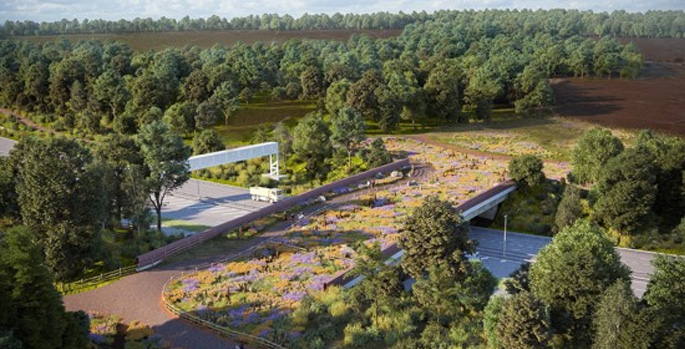National Highways has announced it will double its green bridges across the road network over the next two years.
This announcement was released as a part of its Nature Week, which highlights some of the company's environmental work such as its £11.56m Network for Nature programme with The Wildlife Trust.
The Network for Nature programme will include the delivery of a total of 40 habitat-enhancing projects, which National Highways states will ‘benefit people, nature and wildlife’ where road building has impacted the surrounding environment.
National Highways has already constructed green bridges over the A556 near Chester and the A21 at Scotney Castle in Kent, with three more planned to follow: one spanning the A30 in Cornwall, one as part of the A417 Missing Link scheme near Gloucester, and another at Wisley in Surrey, as part of the M25 Junction 10 scheme.
First used in France in the 1950s, green bridges are now a key part of the sustainability of highway infrastructure projects, as they create a safe crossing point for wildlife movement, link habitats and connect colonies to make wildlife populations more resilient.
They also help create a safe crossing point for people and allow roads to be integrated into the surrounding landscape.
As part of the A30 Chiverton to Carland Cross dualling project, a dual-deck bridge has been constructed by contractors Costain, with top soiling work due to start later this month, followed by ‘green’ planting in the autumn. The bridge – 49.3 metres in length and 12.5m wide – will provide safe passage across the road for wildlife along with a footpath and a bridleway for horse riders.
The 68-metre long Cockrow Bridge, as part of the M25 Junction 10 scheme, has been designed to reunite restored heathland on Wisley Common and Ockham Common and will be installed in January.
On behalf of National Highways, Kier will be lifting in 10 steel beams to create the base of the Gloucestershire Way Bridge, as part of the A417 Missing Link road upgrade. The bridge will serve as a multi-purpose crossing for walkers, cyclists, horse riders and various wildlife. At 60m in length and 37m wide, the environmental bridge will cross the new dual carriageway of the A417 and planting will mirror that of the surrounding landscape, including 27 metres of calcareous grassland and hedgerows.
Steve Elderkin, director of environmental sustainability, said: ‘While roads have always connected people and places, they are too often a barrier for nature; severing habitats and contributing to the decline in biodiversity.
‘We have been investing in a huge range of nature-focussed enhancements, and at major project level, this includes large-scale engineered or landscape interventions such as building green bridges and helping to restore peatlands and meadows.
‘Our green bridges are designed to blend with the landscape and connect habitats, animals and people, leaving a lasting legacy which ensures nature thrives.’
Mr Elderkin added: ‘Increasingly we have been working directly with organisations in the conservation sector, including charities and small businesses, and many of these projects have prioritised nature-based solutions, practices which involve working with nature to address climate and human-induced impacts.’
Some of National Highways's other environmental projects, many of which have been delivered through National Highways’ Designated Funds, have included:
• Wetland creation and hedgerow planting to boost nature and reduce flooding for the village of Fillongley near the M6 in Warwickshire
• Providing fresh water to more than 300 hectares of arable land near the A47 in Norfolk, improving resilience to climate change and creating new wetland habitats
• Restoring 50 hectares of degraded peatland at Shap Fells in Cumbria, restoring nature, capturing carbon and preventing flooding
• Reintroducing bison to the Wilder Blean in Kent, promoting a thriving, biodiverse environment
• Restoring and recreating 15.5 hectares of woodland, orchard, grassland and heathland north of Truro, including the planting of 15,000 native tree species within the mid-Cornwall landscape
• Improving water quality at Stover Country Park alongside the A38 near Newton Abbot, Devon.






